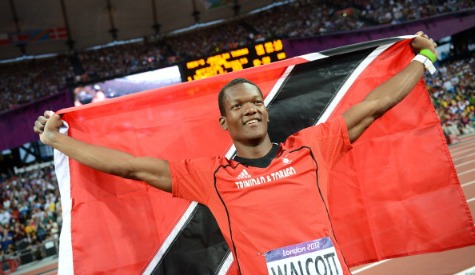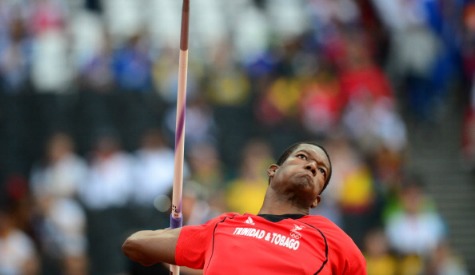 Former FIFA vice president accuses Sepp Blatter of influencing Trinidad’s 2010 election
Former FIFA vice president accuses Sepp Blatter of influencing Trinidad’s 2010 election
Former FIFA official Jack Warner accused the soccer body and its departing president, Sepp Blatter, of influencing his native Trinidad and Tobago’s election in 2010, saying that he was prepared to release reams of evidence of corruption at FIFA.
Mr. Warner, who is one of 14 people named in a U.S. indictment accusing them of complicity in widespread fraud in world soccer, said in a televised address in Trinidad on Wednesday that he feared for his life after compiling a series of documents that he alleged prove links between FIFA and his nation’s government.
“It also deals with my knowledge of international transactions at FIFA, including—but not limited to—its president, Mr. Sepp Blatter, and, lastly, other matters involving the nation’s current prime minister,” he said in the address, a paid political ad titled “The Gloves Are Off.”
Mr. Blatter, FIFA’s long-running president, wasn’t named in the indictment but announced he would resign Tuesday, just days after being re-elected as chief of the world’s soccer governing body. A FIFA spokeswoman declined to comment on the allegations relating to FIFA or to Mr. Blatter personally.
Mr. Warner, who again denied any wrongdoing, said he had a series of documents, including checks—which he had now placed in “different and respected hands”—detailing links between FIFA, its funding and the major political parties in Trinidad. He apologized for not making the documents available sooner. But, “I will no longer keep secrets for them who actively seek to destroy the country,” he said.
The investigations have reverberated across the world of professional soccer. A transcript of the 2013 plea hearing of former U.S. FIFA official Chuck Blazer, which was unsealed on Wednesday, detailed some of the allegations. Mr. Blazer—who provided information that helped lead to last week’s charges—told a U.S. judge in Brooklyn that he had agreed with others to facilitate bribes in connection with selecting some World Cups and other soccer tournaments.
Neither the prime minister’s office in Trinidad and Tobago nor the country’s embassy in London could be reached for comment.
“I have suffered derision, indignity and ridicule, and I have kept my mouth shut,” Mr. Warner said in his televised address. “I will do so no more.”
Separately, the head of Australia’s soccer federation said the organization was awaiting the results of an inquiry into a $500,000 donation it made to Concacaf, the soccer federation for the Caribbean and North and Central America, to fund a feasibility study for a Center of Excellence in Trinidad and Tobago. Australia had made the donation in the run-up to its failed bid to host the 2022 World Cup, along with funds for other sports-development and humanitarian projects abroad.
In an open letter Wednesday, Football Federation of Australia Chairman Frank Lowy said that an initial inquiry conducted by Concacaf found that Mr. Warner had committed fraud and misappropriated the money. Mr. Lowy, one of Australia’s wealthiest individuals, said the inquiry found other instances of wrongdoing by Mr. Warner over many years, though he didn’t elaborate.
“We ran a clean bid,” Mr. Lowy said. “I know that others did not, and I have shared what I know with the authorities.”
Mr. Lowy said that FIFA and former U.S. prosecutor Michael Garcia—who had been appointed by FIFA to investigate the 2018 and 2022 World Cup bidding process but resigned in December in protest—then took over the inquiry. Mr. Lowy said that inquiry wasn’t yet finished. “We asked Concacaf to give our money back because it wasn’t used for the purpose we intended, and were advised by FIFA to wait until the inquiries were complete,” he said.
Mr. Lowy said the center in Trinidad and Tobago had asked for a donation of $4 million, but the Australian federation, or FFA, compromised with an offer of $500,000. He said Mr. Warner was behind the center, but he didn’t say in what capacity.
“The chief executive of the center, not Warner, gave us the bank account details for Concacaf. We paid the money into that account and received confirmation it was received by the bank,” Mr. Lowy said. “It was paid into a Concacaf account, not Jack Warner’s personal account.”
He said the FFA provided information about its donation when Concacaf got in touch to say it was conducting an inquiry into its accounts. The initial inquiry was conducted by two former judges and a senior accountant. The FFA also became aware that U.S. law-enforcement authorities were looking into the matter, Mr. Lowy added.

 A new strategic marketing and brand management plan has been launched by the Trinidad and Tobago Olympic Committee (TTOC) to help it achieve its target of winning at least 10 gold medals by 2024.
A new strategic marketing and brand management plan has been launched by the Trinidad and Tobago Olympic Committee (TTOC) to help it achieve its target of winning at least 10 gold medals by 2024.  The TTOC intends to put in place the required legal checks and balances for Rio 2016 to protect its Olympic franchise, including the TTOC, the Trinidad and Tobago Olympic Team and the legitimate TTOC Olympic sponsors and partners, from opportunistic marketing and ambushers, it has warned.
The TTOC intends to put in place the required legal checks and balances for Rio 2016 to protect its Olympic franchise, including the TTOC, the Trinidad and Tobago Olympic Team and the legitimate TTOC Olympic sponsors and partners, from opportunistic marketing and ambushers, it has warned.  Under the IOC Olympic Charter, the TTOC has sole and exclusive authority for the Trinidad and Tobago Olympic Team, Olympic Movement and Olympic franchise in the jurisdiction of Trinidad and Tobago.
Under the IOC Olympic Charter, the TTOC has sole and exclusive authority for the Trinidad and Tobago Olympic Team, Olympic Movement and Olympic franchise in the jurisdiction of Trinidad and Tobago. ON MAY 27th an early-dawn raid at a posh Swiss hotel brought nine bigwigs from FIFA, football’s international governing body, into custody for allegations of corruption. After years when the game’s leaders managed to avoid any consequences for their unsavoury mismanagement, fans around the world cheered the round-up as a first step towards cleaning up the sport. But the American indictment that put these seemingly untouchable fat cats in the dock had nothing to do with FIFA’s best-known dirty laundry, such as the awarding of the 2022 World Cup to Qatar. Instead, it focused entirely on wrongdoing by officials in the Americas, and in particular on CONCACAF, one of the relative weaklings among FIFA’s six constituent continental federations, which includes North and Central America and the Caribbean. The two biggest fish, Jeffrey Webb and Austin “Jack” Warner (pictured)—the current CONCACAF president and his predecessor—hail from two of the smallest countries in the world, the Cayman Islands and Trinidad and Tobago.
ON MAY 27th an early-dawn raid at a posh Swiss hotel brought nine bigwigs from FIFA, football’s international governing body, into custody for allegations of corruption. After years when the game’s leaders managed to avoid any consequences for their unsavoury mismanagement, fans around the world cheered the round-up as a first step towards cleaning up the sport. But the American indictment that put these seemingly untouchable fat cats in the dock had nothing to do with FIFA’s best-known dirty laundry, such as the awarding of the 2022 World Cup to Qatar. Instead, it focused entirely on wrongdoing by officials in the Americas, and in particular on CONCACAF, one of the relative weaklings among FIFA’s six constituent continental federations, which includes North and Central America and the Caribbean. The two biggest fish, Jeffrey Webb and Austin “Jack” Warner (pictured)—the current CONCACAF president and his predecessor—hail from two of the smallest countries in the world, the Cayman Islands and Trinidad and Tobago. Sports Minister Brent Sancho says he was unaware that a concert booking accepted by the facilities management unit at the Hasely Crawford Stadium (HCS) in Woodbrook forced officials of the National Association of Athletics Administration (NAAA) to reschedule its calendar of championship events originally scheduled to start last weekend.
Sports Minister Brent Sancho says he was unaware that a concert booking accepted by the facilities management unit at the Hasely Crawford Stadium (HCS) in Woodbrook forced officials of the National Association of Athletics Administration (NAAA) to reschedule its calendar of championship events originally scheduled to start last weekend. TTOC president Brian Lewis has called into question the willingness and commitment of the Ministry of Sports and the Sports Company of T&T (SporTT) to validate legitimate efforts by the National Association of Athletics Administrations (NAAA) and its corporate partners to promote the growth and sustainability of track and field in T&T.
TTOC president Brian Lewis has called into question the willingness and commitment of the Ministry of Sports and the Sports Company of T&T (SporTT) to validate legitimate efforts by the National Association of Athletics Administrations (NAAA) and its corporate partners to promote the growth and sustainability of track and field in T&T. First Citizens ‘Sportsman of the Year’, George Bovell will resume his build-up to next month’s Pan American Games in Canada and the FINA World Aquatic Championship in Kazan a month later, when he competes at the Tropheo Citta in Rome Italy, over the next two days.
First Citizens ‘Sportsman of the Year’, George Bovell will resume his build-up to next month’s Pan American Games in Canada and the FINA World Aquatic Championship in Kazan a month later, when he competes at the Tropheo Citta in Rome Italy, over the next two days.